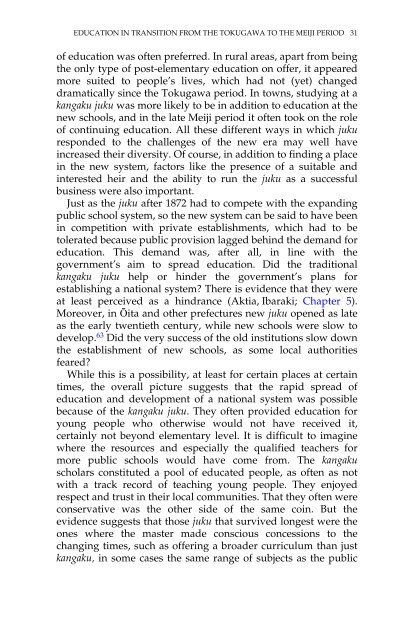Private Academies of Chinese Learning in Meiji Japan: The Decline ...
Private Academies of Chinese Learning in Meiji Japan: The Decline ...
Private Academies of Chinese Learning in Meiji Japan: The Decline ...
You also want an ePaper? Increase the reach of your titles
YUMPU automatically turns print PDFs into web optimized ePapers that Google loves.
EDUCATION IN TRANSITION FROM THE TOKUGAWA TO THE MEIJI PERIOD 31<strong>of</strong> education was <strong>of</strong>ten preferred. In rural areas, apart from be<strong>in</strong>gthe only type <strong>of</strong> post-elementary education on <strong>of</strong>fer, it appearedmore suited to people’s lives, which had not (yet) changeddramatically s<strong>in</strong>ce the Tokugawa period. In towns, study<strong>in</strong>g at akangaku juku was more likely to be <strong>in</strong> addition to education at thenew schools, and <strong>in</strong> the late <strong>Meiji</strong> period it <strong>of</strong>ten took on the role<strong>of</strong> cont<strong>in</strong>u<strong>in</strong>g education. All these different ways <strong>in</strong> which jukuresponded to the challenges <strong>of</strong> the new era may well have<strong>in</strong>creased their diversity. Of course, <strong>in</strong> addition to f<strong>in</strong>d<strong>in</strong>g a place<strong>in</strong> the new system, factors like the presence <strong>of</strong> a suitable and<strong>in</strong>terested heir and the ability to run the juku as a successfulbus<strong>in</strong>ess were also important.Just as the juku after 1872 had to compete with the expand<strong>in</strong>gpublic school system, so the new system can be said to have been<strong>in</strong> competition with private establishments, which had to betolerated because public provision lagged beh<strong>in</strong>d the demand foreducation. This demand was, after all, <strong>in</strong> l<strong>in</strong>e with thegovernment’s aim to spread education. Did the traditionalkangaku juku help or h<strong>in</strong>der the government’s plans forestablish<strong>in</strong>g a national system? <strong>The</strong>re is evidence that they wereat least perceived as a h<strong>in</strong>drance (Aktia, Ibaraki; Chapter 5).Moreover, <strong>in</strong> Ōita and other prefectures new juku opened as lateas the early twentieth century, while new schools were slow todevelop. 63 Did the very success <strong>of</strong> the old <strong>in</strong>stitutions slow downthe establishment <strong>of</strong> new schools, as some local authoritiesfeared?While this is a possibility, at least for certa<strong>in</strong> places at certa<strong>in</strong>times, the overall picture suggests that the rapid spread <strong>of</strong>education and development <strong>of</strong> a national system was possiblebecause <strong>of</strong> the kangaku juku. <strong>The</strong>y <strong>of</strong>ten provided education foryoung people who otherwise would not have received it,certa<strong>in</strong>ly not beyond elementary level. It is difficult to imag<strong>in</strong>ewhere the resources and especially the qualified teachers formore public schools would have come from. <strong>The</strong> kangakuscholars constituted a pool <strong>of</strong> educated people, as <strong>of</strong>ten as notwith a track record <strong>of</strong> teach<strong>in</strong>g young people. <strong>The</strong>y enjoyedrespect and trust <strong>in</strong> their local communities. That they <strong>of</strong>ten wereconservative was the other side <strong>of</strong> the same co<strong>in</strong>. But theevidence suggests that those juku that survived longest were theones where the master made conscious concessions to thechang<strong>in</strong>g times, such as <strong>of</strong>fer<strong>in</strong>g a broader curriculum than justkangaku, <strong>in</strong> some cases the same range <strong>of</strong> subjects as the public













